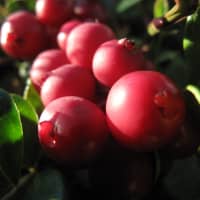Lingonberries, also known as Vaccinium vitis-idaea, partridgeberry, mountain cranberry or cowberry, is a short evergreen shrub in the heath family that bears edible fruit. The berries contain plentiful organic acids, vitamin C, vitamin A (as beta carotene), B vitamins (B1, B2, B3), and the elements potassium, calcium, magnesium, and phosphorus.
Biological Properties
Weight Loss
Lingonberries significantly decreased body fat content and hepatic lipid accumulation (fatty liver).[1]
Glucose Regulation
Lingonberries mediated positive effects on glucose homeostasis.[1:1]
Disease / Symptom Treatment
Obesity
Lingonberries were shown to fully or partially prevent the detrimental metabolic effects induced by high-fat diet.[1:2]
Title: Evaluation of Beneficial Metabolic Effects of Berries in High-Fat Fed C57BL/6J Mice
Author(s): Lovisa Heyman,1 Ulrika Axling,1 Narda Blanco,2 Olov Sterner,2 Cecilia Holm,1 and Karin Berger1
Institution(s): Department of Experimental Medical Science, Lund University, Lund, Sweden 2Centre for Analysis and Synthesis Organic Chemistry, Department of Chemistry, Lund University, P.O. Box 124, 22100 Lund, Sweden
Publication: Journal of Nutrition and Metabolism
Date: 14 January 2014
Abstract: Objective. The aim of the study was to screen eight species of berries for their ability to prevent obesity and metabolic abnormalities associated with type 2 diabetes. Methods. C57BL/6J mice were assigned the following diets for 13 weeks: low-fat diet, high-fat diet or high-fat diet supplemented (20%) with lingonberry, blackcurrant, bilberry, raspberry, açai, crowberry, prune or blackberry. Results. The groups receiving a high-fat diet supplemented with lingonberries, blackcurrants, raspberries or bilberries gained less weight and had lower fasting insulin levels than the control group receiving high-fat diet without berries. Lingonberries, and also blackcurrants and bilberries, significantly decreased body fat content, hepatic lipid accumulation, and plasma levels of the inflammatory marker PAI-1, as well as mediated positive effects on glucose homeostasis. The group receiving açai displayed increased weight gain and developed large, steatotic livers. Quercetin glycosides were detected in the lingonberry and the blackcurrant diets. Conclusion. Lingonberries were shown to fully or partially prevent the detrimental metabolic effects induced by high-fat diet. Blackcurrants and bilberries had similar properties, but to a lower degree. We propose that the beneficial metabolic effects of lingonberries could be useful in preventing obesity and related disorders.
Link: Source
Citations: ↩︎ ↩︎ ↩︎
